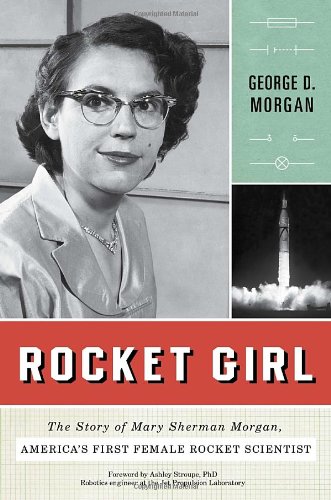

| ROCKET GIRL The Story of Mary Sherman Morgan, America's First Female Rocket Scientist George D. Morgan Amherst, NY: Prometheus Books, July 2013 |
Rating: 5.0 High |
|||
| ISBN-13 978-1-61614-739-6 | ||||
| ISBN-10 1-61614-739-3 | 325pp. | SC/BWI | $18.00 | |
George Morgan's Rocket Girl introduces us to its subject in a nonstandard but captivating way. Eight years old, she is trapped on a run-down farm in North Dakota. As his story opens, the sheriff and a social worker are driving up the rutted road to the farmhouse. They climb the steps and enter after no one answers their knock.
"Michael Sherman was hunched forward in a wooden chair, drunk and still. Around the chair, like a protective circle of wagons, lay a ring of empty wine bottles. At the far side of the room, eight-year-old Mary stood alone, pale and quiet." "My dad's asleep." Sheriff Knowles shook the man's shoulder. "Mike—wake up. Come on, Mike." *
* * Betty stepped forward. "Mister Sherman, your daughter still is not attending school. She is eight years old—more than two years behind her peers. If you do not enroll her today you will be arrested." – Page 19 |
Running strongly through this narrative is the urgency of dedication to an ideal. Wernher von Braun had it. Sergei Korolev had it. And so did Mary Sherman Morgan. Though the nature of their ideals differed, they all had a core of self-advancement. But what ideal that makes an impact on the world does not?
Though it would not be well acknowledged, overshadowed as it was by the spectacle of launches to come, the real legacy of Sergei Korolev and Wernher von Braun was the inspiration they afforded a generation of youth to pursue careers they might otherwise never have considered. – Page 279 |
I was alive in 1957, and I well remember the wonder of seeing the tiny star of Sputnik swim across the sky. It certainly was a factor in the career I chose.
Getting humans into space remains important but, as with Eisenhower back then, the political winds have drifted away from strong support for it. I think it's time we saw that support again. This book will help.
This makes it appear that Mary's father is a total wastrel, drunk all the time. That is an exaggeration; he does work the farm and has a wife, three sons and two daughters to help him.1 He and his wife, however, don't set much store by education and cannot abide modern things like photography.2
To brutally condense the story: on graduating from high school, Mary runs away from home to attend college but has to drop out. Eventually, by sheer grit, she gets a job with North American Aviation as a rocket fuels analyst3 and ends up solving a problem that stumps Wernher von Braun and his team.
Mrs. Morgan's story is interleaved with some of the history of World War II — in which an infantryman named John M. Galione disobeys orders to scout a German railway line that's not on his map and discovers the Mittelwerk facility and the Dora concentration camp. Other threads are von Braun's work on the Redstone rocket and Segei Korolev's parallel development of the R-7 rocket in Russia, which lofted Sputnik on 4 October 1957.
And the author does not neglect the geopolitics of the space race.
"The failure of American and international leaders at all levels, both civilian and military, to understand beforehand the significance that a maiden satellite would have on Earth's human population turned out to be one of the moist spectacular political blunders of all time. For years, a handful of engineers, led by Wernher von Braun, had pressed President Eisenhower and his government about the urgency of moving satellite technology off the drawing boards and into space. But the president had always been dismissive of their warnings. The political climate would have been just as bad in the Soviet Union had not Stalin and his military leaders been so hungry to build an arsenal of ICBMs. Only a small number of countries had the engineering know-how to launch a satellite, and each and every one of them was crippled by institutional myopia." – Page 253 |
Motivated by the fact that his mother's achievements were so little known to the public that the Los Angeles Times refused to publish her obituary, George Morgan first wrote a play about her that was staged at CalTech in 2009. He then wrote this book to bring her to a wider audience.
It is done in the genre called creative nonfiction. That is to say it dramatizes real events by including some invented features such as dialog. The author discloses at the end of the book that much of the dialog and one character (Colonel Wilkins) are invented. But do not be dissuaded; the real events of Mrs. Morgan's life have enough of drama in them to satisfy any reader, and her son conveys them very well. There are a few aspects I would have put a different slant on, but they are peripheral to the main story. Sixteen black-and-white photographs gleaned from family archives supplement the text, and there are endnotes and a decent index. I give the book top marks and rate it a keeper.

 To contact Chris Winter, send email to this address.
To contact Chris Winter, send email to this address.